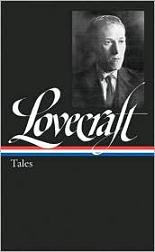
Tales
H. P. Lovecraft
838 pages
published in 2005
This deceptively slim volume, much slimmer than the similarly titled 1997 Jocye Carol Oates edited collection of Lovecraft stories, turned out to be printed on the kind of paper they use to print those teeny tiny complete bibles with. So what I thought would be a weeks worth of reading actually needed two long train journeys to finish, by the time I was somewhat bored by Lovecraft's eldritch obsessions. After a while all the lurking horrors and dwellers in the darkness start to blur into each other and the descriptions turn from atmospheric into mildly ridiculous. Lovecraft is not a writer you should over indulge in; it's better to read him sparingly story by story.
As a collection this is an impressive book, part of the prestigious Library of America series set up to safeguard America's literary heritage. That H. P. Lovecraft, as first science fiction, horror or fantasy writer is allowed in these hallowed pages as a genre writer, not ust an established literary figure dabbling in these genres, is a good sign of how far these genres have penetrated literary consciousness. You may quibble about Lovecraft as a first choice, but he has slowly evolved from a cult writer into one appreciated as much for his literary qualities as his ability to scare his readers so he's certainly not an undefensible choice.
As I've said before, what I like about Lovecraft is how he took all the developments in science that the Golden Age science fiction writers were so enthusiastic about slightly later and turned them into horror. Instead of seeing a vast canvas for adventure, he saw humanity driven mad when it understood its proper place in the universe. In that context Lovecraft is a much more representative of his period than his more optimistic colleagues in the sf pulps. He takes all the horror and despair of the Great War and turns it into something sublime, yet still horrific. For this reason alone Lovecraft deserves inclusion in the Library of America.
Another reason is his incredible sense of place. He's as much if not more so a New England writer as somebody like Nathaniel Hawthorne is. He manages not just to put the look of all these crumbling seatowns, small villages and dark forest on paper, but much more importantly, their atmosphere.
This Library of America volume is very well prepared. The stories are arranged in chronological order and taken as much as possible from Lovecraft's original manuscripts, rather than from the publised version. The editor is S. T. Joshi, well known as a Lovecraft critic and biographer, with Peter Straub as the selector of the stories. I won't bother to review the individual stories, as I've largely done this in the review of the Joyce Carol Oates collection already.
- The Statement of Randolph Carter [Randolph Carter] · ss The Vagrant May 20; Weird Tales Feb 25
- The Outsider · ss Weird Tales Apr 26
- The Music of Erich Zann · ss The National Amateur Mar 22; Weird Tales Nov 34
- Herbert West--Reanimator ["Grewsome Tales"] · gp Home Brew Feb-Jul 22; From the Dark, ss Weird Tales Mar 42; The Plague Demon, ss Weird Tales Jul 42; Six Shots by Moonlight, ss Weird Tales Sep 42; The Scream of the Dead, ss Weird Tales Nov 42; The Horror from the Shadows, ss Weird Tales Sep 43; The Tomb-Legions, ss Weird Tales Nov 43
- The Lurking Fear · nv Home Brew Jan 23 (+3); Weird Tales Jun 28
- The Rats in the Walls · ss Weird Tales Mar 24
- The Shunned House · nv Weird Tales Oct 37
- The Horror at Red Hook · nv Weird Tales Jan 27
- He · ss Weird Tales Sep 26
- Cool Air · ss Tales of Magic and Mystery Mar 28; Weird Tales Jul 27
- The Call of Cthulhu [Inspector Legrasse] · nv Weird Tales Feb 28
- Pickmans Model · ss Weird Tales Oct 27
- The Case of Charles Dexter Ward · na Weird Tales May 41
- The Colour Out of Space · nv Amazing Sep 27
- The Dunwich Horror · nv Weird Tales Apr 29
- The Whisperer in Darkness · na Weird Tales Aug 31
- At the Mountains of Madness · n. Astounding Feb 36
- The Shadow Over Innsmouth · na Visionary Press: Everett, PA, 1936; Weird Tales Jan 42
- The Dreams in the Witch-House · nv Weird Tales Jul 33
- The Thing on the Doorstep · nv Weird Tales Jan 37
- The Shadow Out of Time · na Astounding Jun 36
- The Haunter of the Dark · nv Weird Tales Dec 36
Read more about:
H. P. Lovecraft,
Peter Straub,
science fiction,
horror,
book review